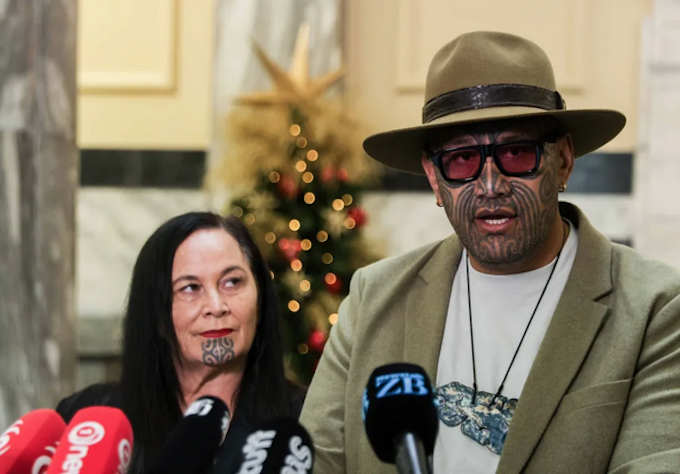
ANALYSIS: By Craig McCulloch, RNZ News acting political editor
As the Iwi Chairs Forum fought fruitlessly to keep Te Pāti Māori together last week, spokesperson Bayden Barber offered a warning: a split tōtara is only good for the fire.
Now Te Pāti Māori finds itself in an inferno.
The slow-burn conflagration in Aotearoa New Zealand has been smouldering for so long, it’s easy to miss the magnitude. But this is no small matter.
- READ MORE: What happens next for Te Pāti Māori and expelled MPs Mariameno Kapa-Kingi, Tākuta Ferris?
- Other Te Pāti Māori reports
This is a party ousting a third of its caucus, citing “irreconcilable differences” and “serious breaches” of its constitution.
Fronting reporters today, co-leaders Debbie Ngarewa-Packer and Rawiri Waititi wished their former colleagues “all the best of luck” and waved them on their way.
“We had to bring this to a close, and we must move on.”
But that seems overly hopeful. Both Mariameno Kapa-Kingi and Tākuta Ferris were quick to declare the move “unconstitutional” and are threatening to challenge it “in all respects”.
Waka-jumping provision
The party’s National Council has also yet to consider whether to invoke the waka-jumping provision and eject the MPs from Parliament altogether.
Te Pāti Māori co-leaders announce MPs’ expulsion Video: RNZ News
That would require agreement of the two other remaining MPs — Hana-Rawhiti Maipi-Clarke and Oriini Kaipara. It’s unclear yet where they stand in all this.
Either outcome is ugly. If the “rogue” MPs remain, they will serve as a constant reminder of division. If they are booted, two byelections loom, sure to be bitter and bruising.
At least a public contest might shed more clarity on what’s behind the weeks of infighting, with voters so far largely left in a cloud of smoke.
Asked to clarify on Monday exactly what the MPs had done to deserve expulsion, the co-leaders refused: “You’re not going to get that detail here in this press conference.”
From what has dripped out over the past six weeks, it seems the feud is driven more by personality than principle.
Party president John Tamihere has accused the two MPs of plotting a failed coup. Kapa-Kingi and Ferris have declared no confidence in Tamihere, with their supporters decrying toxic dictatorial leadership.
Past wave of unity
Supporters are right to feel aggrieved. A year ago, Te Pāti Māori was riding a wave of unity and purpose, as a driving force behind the historic Toitū Te Tiriti hikoi.

It boasted its largest-ever caucus, having swept six of the seven Māori electorates in a dominant 2023 result.
Ironically, the roots of the recent crisis lie in that rapid expansion.
The co-leaders went from being a dynamic duo to overseeing a more assertive caucus and competing egos.
Tamihere, Ngarewa-Packer and Waititi are all dominant personalities, used to steering their own course.
But both Kapa-Kingi and Ferris regard themselves as electorate MPs first, answerable to their own people, not to the central hierarchy.
Add in the whānau ties on either side, and the conflict shifts from political to personal.
Party’s brand damaged
The co-leaders admit the recent disunity has damaged the party’s brand. The enthusiasm of a year ago has turned to disillusionment, with voters now forced to pick sides or to look elsewhere.
When Hone Harawira split from the Māori Party in 2011 to form Mana, both sides eventually vanished. Harawira was sent packing by voters in 2014, and the rest of the Māori Party followed in 2017.
For the wider opposition, there is good and bad here.
The Labour Party will see an opportunity to win over those disenchanted voters and to retake the Māori electorates amidst a more divided race.
But the wider picture is riskier. Centrist voters may well look at the turmoil on the left and decide to stick with the status quo.
Labour leader Chris Hipkins has yet to publicly declare whether he would welcome Te Pāti Māori as part of a future Cabinet.
Those questions will only grow louder now — expanding to include the “rogues”. Where do they stand in any coalition calculation?
The Iwi Chairs Forum had arranged “peace talks” this week, bringing together the two factions at a Wellington marae.
Bayden Barber still thinks that would be beneficial and the co-leaders agree it could still go ahead. But few expect much to come of it now.
The next moment of reckoning may come on December 7, when members gather in Rotorua for the party’s AGM — and confront how Te Pāti Māori can piece itself together from the ashes.
This article is republished under a community partnership agreement with RNZ.














































